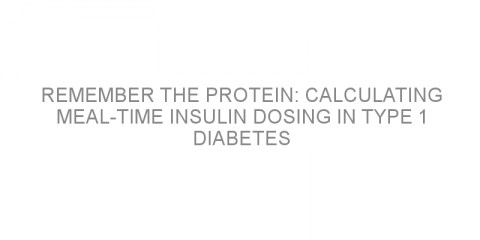In a nutshell This study investigated the effectiveness and safety of dulaglutide (Trulicity) in combination with insulin in people with type 2 diabetes (T2D). It was determined that adding dulaglutide reduced HbA1c (measures average blood glucose over the last 3 months), reduced body weight, and did not increase the risk of hypoglycemia (dangerously low...
Read MoreDiabetes mellitus Posts on Medivizor
I Keep Getting Up At Night To Go to the Bathroom: Nocturia and Nocturnal Polyuria
By Professor Steven Kaplan, MD “I never get a full night’s sleep…I’ve got to get up two or three times a night.” “As soon as I lie down, I feel like I need to GO!” “When it was just once a night, I could handle it. Now it’s once every hour!” If any of these statements describe your experience,...
Read MoreRemember the protein: calculating meal-time insulin dosing in type 1 diabetes
In a nutshell This study examined whether the meal-time insulin dose should be calculated based on the carbohydrate count or the combination of carbohydrate plus protein. The study concluded that calculating the dose based on both carbohydrate and protein may be more effective. Some background Patients with type 1 diabetes can benefit from a...
Read MoreEffects of gestational diabetes in early pregnancy
In a nutshell This study compared the outcomes of women diagnosed with gestational diabetes mellitus (GDM; diabetes first appearing in pregnancy) who were diagnosed before 24 weeks of pregnancy with those diagnosed after 24 weeks. The study concluded that earlier diagnosis was associated with lower rates of excess weight gain, higher blood glucose...
Read MoreLow glycemic index diets for the management of type 2 diabetes
In a nutshell This study investigated the effectiveness of low-glycemic index (GI) diets in patients with type 2 diabetes. The authors concluded that the low-glycemic index diets are more effective in controlling blood sugar levels compared to high-glycemic index or other diets in these patients. Some background In addition to physical exercise, the...
Read MoreDoes a very-low carbohydrate diet help improve glycemic control for type 1 diabetes?
In a nutshell This study evaluated blood glucose control in adults and children with type 1 diabetes on a very low-carbohydrate diet (VLCD). This study concluded that this diet may provide exceptional control for type 1 diabetes, with minimal side effects. Some background Research has shown that carbohydrates affect blood sugar levels more than...
Read MoreCan triple-therapy be as safe as using just two medications in type 2 diabetes?
In a nutshell This study compared the safety of using three different medications to treat type 2 diabetes (T2D) with using only two of those medications. It was determined that using three medications was as safe as using two. Some background Control of blood glucose levels is important to prevent the long-term complications of T2D....
Read MoreAntioxidants in Grapes and Avocados
The mitochondria in cells produce energy. In the process they form reactive oxygen species. Reactive oxygen species, also called free radicals or oxygen radicals are used in many metabolic processes that are essential to life. For example, they are are part of enzyme reactions in the body. White blood cells, like neutrophils produce reactive oxygen...
Read MoreDiabetes Burnout
“I just don’t think about my diabetes. It’s too complicated and I’m too busy.” “I’ve given up on carb counting and just eat whatever.” “If my blood sugar is out of range, I just don’t care.” “Family and friends don’t support me. ” “I feel hopeless.” If these...
Read MoreHow effective and safe are SGLT2 inhibitors combined with insulin for type 1 diabetes?
In a nutshell This study investigated the effectiveness and safety of adding SGLT2 inhibitors to insulin in type 1 diabetes (T1D). The authors concluded that add-on SGLT-2 inhibitor therapy may be helpful for T1D, but should be carefully considered due to potential side effects. Some background The goal of T1D management is to reach and maintain...
Read MoreWhat are the long-term outcomes with second-line treatments in type 2 diabetes?
In a nutshell This study investigated the long-term glycemic (blood sugar) control of type 2 diabetes patients receiving second-line medications with or without metformin (Glucophage). This study concluded that GLP-1 receptor agonists, DPP-4 inhibitors and thiazolidinedione-based therapies offer a higher chance of long-term glycemic control compared to...
Read MoreDoes a low-carbohydrate diet improve outcomes more than a moderate-carbohydrate diet in patients with prediabetes or Type 2 diabetes?
In a nutshell This study investigated the outcomes of a very low-carbohydrate (ketogenic) diet versus a moderate-carbohydrate diet in adults with prediabetes or Type 2 diabetes. This study concluded that the adults on the low-carbohydrate diet had greater reductions in HbA1c levels (average blood glucose over 3 months), body weight, and medication usage...
Read More












